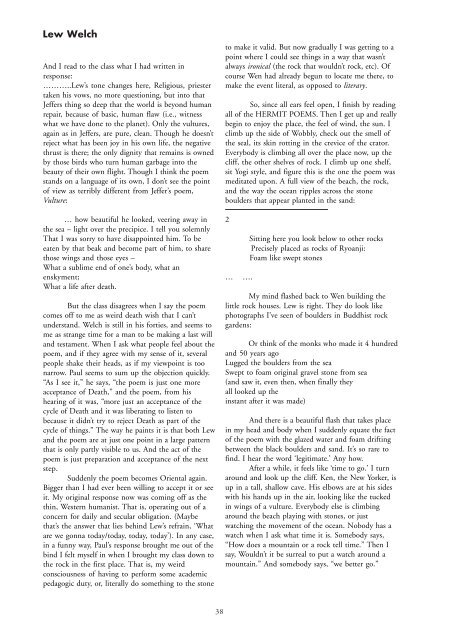You also want an ePaper? Increase the reach of your titles
YUMPU automatically turns print PDFs into web optimized ePapers that Google loves.
Lew Welch<br />
And I read to the class what I had written in<br />
response:<br />
………..Lew’s tone changes here, Religious, priester<br />
taken his vows, no more questioning, but into that<br />
Jeffers thing so deep that the world is beyond human<br />
repair, because of basic, human flaw (i.e., witness<br />
what we have done to the planet). Only the vultures,<br />
again as in Jeffers, are pure, clean. Though he doesn’t<br />
reject what has been joy in his own life, the negative<br />
thrust is there; the only dignity that remains is owned<br />
by those birds who turn human garbage into the<br />
beauty of their own flight. Though I think the poem<br />
stands on a language of its own, I don’t see the point<br />
of view as terribly different from Jeffer’s poem,<br />
Vulture:<br />
… how beautiful he looked, veering away in<br />
the sea – light over the precipice. I tell you solemnly<br />
That I was sorry to have disappointed him. To be<br />
eaten by that beak and become part of him, to share<br />
those wings and those eyes –<br />
What a sublime end of one’s body, what an<br />
enskyment;<br />
What a life after death.<br />
But the class disagrees when I say the poem<br />
comes off to me as weird death wish that I can’t<br />
understand. Welch is still in his forties, and seems to<br />
me as strange time for a man to be making a last will<br />
and testament. When I ask what people feel about the<br />
poem, and if they agree with my sense of it, several<br />
people shake their heads, as if my viewpoint is too<br />
narrow. Paul seems to sum up the objection quickly.<br />
“As I see it,” he says, “the poem is just one more<br />
acceptance of Death,” and the poem, from his<br />
hearing of it was, “more just an acceptance of the<br />
cycle of Death and it was liberating to listen to<br />
because it didn’t try to reject Death as part of the<br />
cycle of things.” The way he paints it is that both Lew<br />
and the poem are at just one point in a large pattern<br />
that is only partly visible to us. And the act of the<br />
poem is just preparation and acceptance of the next<br />
step.<br />
Suddenly the poem becomes Oriental again.<br />
Bigger than I had ever been willing to accept it or see<br />
it. My original response now was coming off as the<br />
thin, Western humanist. That is, operating out of a<br />
concern for daily and secular obligation. (Maybe<br />
that’s the answer that lies behind Lew’s refrain, ‘What<br />
are we gonna today/today, today, today’). In any case,<br />
in a funny way, Paul’s response brought me out of the<br />
bind I felt myself in when I brought my class down to<br />
the rock in the first place. That is, my weird<br />
consciousness of having to perform some academic<br />
pedagogic duty, or, literally do something to the stone<br />
to make it valid. But now gradually I was getting to a<br />
point where I could see things in a way that wasn’t<br />
always ironical (the rock that wouldn’t rock, etc). Of<br />
course Wen had already begun to locate me there, to<br />
make the event literal, as opposed to literary.<br />
So, since all ears feel open, I finish by reading<br />
all of the HERMIT POEMS. Then I get up and really<br />
begin to enjoy the place, the feel of wind, the sun. I<br />
climb up the side of Wobbly, check out the smell of<br />
the seal, its skin rotting in the crevice of the crator.<br />
Everybody is climbing all over the place now, up the<br />
cliff, the other shelves of rock. I climb up one shelf,<br />
sit Yogi style, and figure this is the one the poem was<br />
meditated upon. A full view of the beach, the rock,<br />
and the way the ocean ripples across the stone<br />
boulders that appear planted in the sand:<br />
2<br />
…<br />
….<br />
Sitting here you look below to other rocks<br />
Precisely placed as rocks of Ryoanji:<br />
Foam like swept stones<br />
My mind flashed back to Wen building the<br />
little rock houses. Lew is right. They do look like<br />
photographs I’ve seen of boulders in Buddhist rock<br />
gardens:<br />
Or think of the monks who made it 4 hundred<br />
and 50 years ago<br />
Lugged the boulders from the sea<br />
Swept to foam original gravel stone from sea<br />
(and saw it, even then, when finally they<br />
all looked up the<br />
instant after it was made)<br />
And there is a beautiful flash that takes place<br />
in my head and body when I suddenly equate the fact<br />
of the poem with the glazed water and foam drifting<br />
between the black boulders and sand. It’s so rare to<br />
find. I hear the word ‘legitimate.’ Any how.<br />
After a while, it feels like ‘time to go.’ I turn<br />
around and look up the cliff. Ken, the New Yorker, is<br />
up in a tall, shallow cave. His elbows are at his sides<br />
with his hands up in the air, looking like the tucked<br />
in wings of a vulture. Everybody else is climbing<br />
around the beach playing with stones, or just<br />
watching the movement of the ocean. Nobody has a<br />
watch when I ask what time it is. Somebody says,<br />
“How does a mountain or a rock tell time.” Then I<br />
say, Wouldn’t it be surreal to put a watch around a<br />
mountain.” And somebody says, “we better go.”<br />
38





